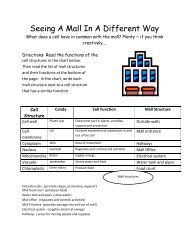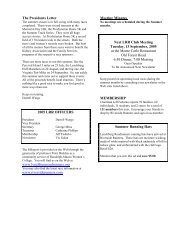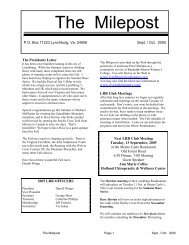Standard PDF - Randolph College
Standard PDF - Randolph College
Standard PDF - Randolph College
Create successful ePaper yourself
Turn your PDF publications into a flip-book with our unique Google optimized e-Paper software.
During one trip, students visited the site of the<br />
Triangle Shirtwaist Factory fire in New York City, where<br />
nearly 150 workers were killed in 1911. The tragedy<br />
led to improved working conditions for millions of<br />
Americans. “It gives it meaning for students,” Sherayko<br />
said. “America changed for the better out of a terrible<br />
tragedy. It is a powerful thing to be there and see that<br />
after reading about it.”<br />
Julio Rodriguez, associate professor of sociology (left), talks with Will Berke ’12 during an<br />
American Culture trip.<br />
On a tour of highways in Pennsylvania, the group<br />
talked with engineers and other transportation experts<br />
about the evolution of highways and the differences<br />
between roads like the Lincoln Highway and the<br />
Pennsylvania Turnpike. The Lincoln Highway, the first<br />
transcontinental highway in the United States, was<br />
designed to encourage travelers to stop at towns along<br />
its route. In comparison, the Pennsylvania Turnpike was<br />
designed to get travelers to their destinations as quickly<br />
as possible.<br />
“The students were able to ride on those highways<br />
and think about what they had learned,” Sherayko said.<br />
“They were able to get a feel for how different things are<br />
now and what that has done to the American psyche.”<br />
The program’s approach provides students with<br />
hands-on knowledge of what they are studying. “It<br />
was hard at first, but it pays off when you start seeing<br />
things from so many different perspectives,” said Jane<br />
Campbell ’12. “You read about things. You listen to<br />
speakers. You look at images. You go on trips where you<br />
can see the places where these major events happened<br />
and experience them with your professors. You are not<br />
just being lectured. It makes it more real and much<br />
more interesting.”<br />
Faculty members in the program try to incorporate<br />
alumnae as much as possible. This year,<br />
students were taken on a behind-the-scenes<br />
tour of the Nemours Mansion and Gardens<br />
in Delaware by Grace Gary ’76, who serves<br />
as the executive director. They also met with<br />
Lynn Kehoe Rollins ’64, who talked about<br />
her role as senior advisor for women’s issues<br />
for George E. Pataki, the former governor<br />
of New York.<br />
“This program made me think more<br />
critically,” Campbell said. “It made me think<br />
about the country in a different way.”<br />
A favorite trip for many of the students<br />
was to visit Margaret Krome-Lukens ’07,<br />
who is assistant director of the Pickard<br />
Mountain Eco Institute in Chapel Hill,<br />
North Carolina. Students met people<br />
involved in the local food movement and<br />
were able to spend time working on the<br />
farm with Krome-Lukens.<br />
The discussions about sustainable food<br />
included a visit on campus from the market<br />
manager of Lynchburg’s Community<br />
Market and discussions about waste, American<br />
consumption, and the growing movement toward<br />
purchasing more local food.<br />
After the session on food, Leonard went out<br />
immediately and bought a lettuce plant. Today, she<br />
harvests leaves from the plant daily. “I see so many things<br />
from a completely different angle now,” Leonard said.<br />
“Take my lettuce plant. If everyone had their own plant,<br />
it would make a huge impact. That applies to everything<br />
in the American Culture Program: the movements, the<br />
civil rights, the transportation, the prison movement, the<br />
gay rights movement. All of them started with individual<br />
people. Enough people started paying attention, and<br />
eventually American thought changed.<br />
“Having that lettuce plant is a constant reminder to<br />
me of what I learned in American Culture,” she added. “It’s<br />
something I can do. It’s a way I can play a part.”<br />
26


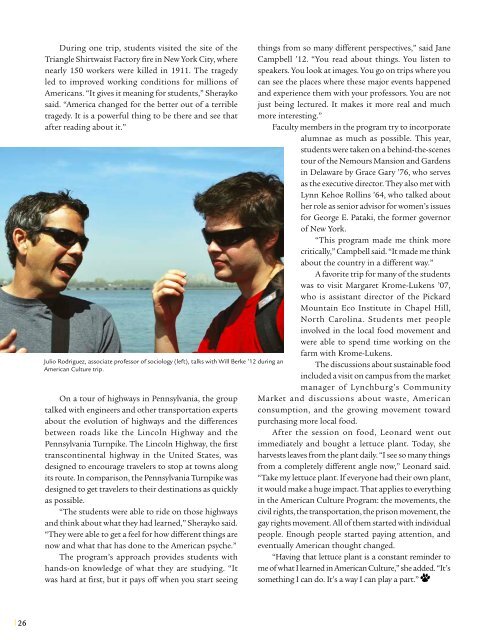

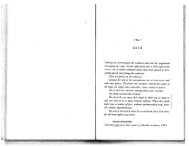
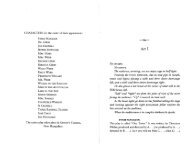

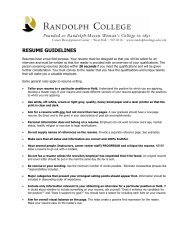
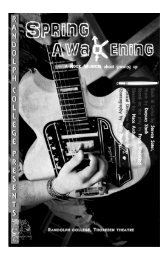
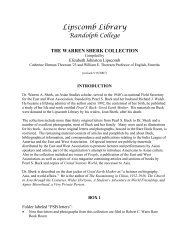

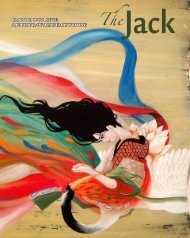
![Cast & Crew List [Program Copy pdf] - Randolph College](https://img.yumpu.com/38268916/1/190x123/cast-crew-list-program-copy-pdf-randolph-college.jpg?quality=85)
